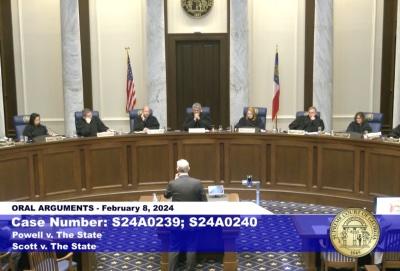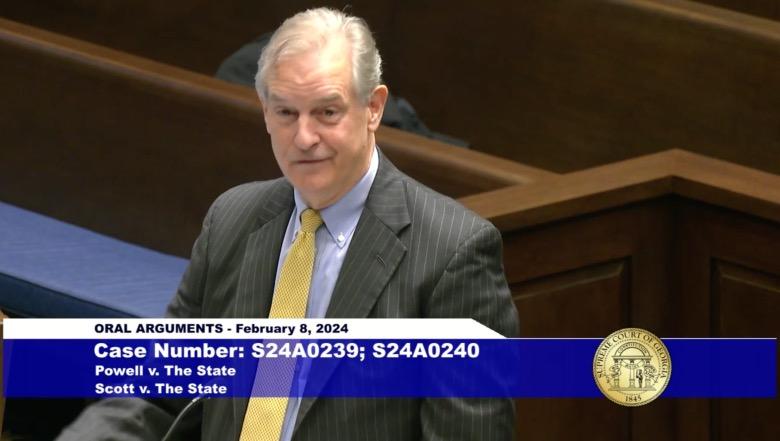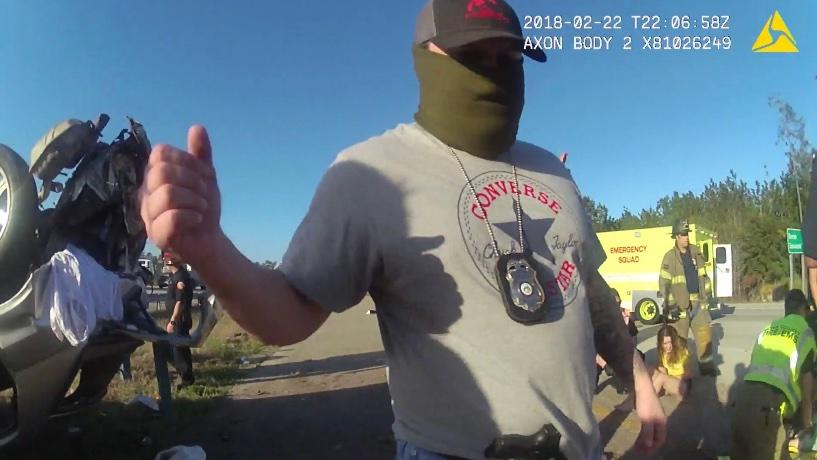
Caption
Georgia Supreme Court justices hear arguments in the criminal case of John Powell, the former Glynn County Police Department chief accused of overlooking misconduct at his agency's corrupt drug unit.
Credit: Screenshot
|Updated: February 14, 2024 3:26 PM

Georgia Supreme Court justices hear arguments in the criminal case of John Powell, the former Glynn County Police Department chief accused of overlooking misconduct at his agency's corrupt drug unit.
Jake Shore, The Current
Illegal or just plain outrageous? These were the parameters within which the Georgia Supreme Court justices parsed the conduct of former Glynn County Police Chief John Powell last week in order to decide the fate of his ongoing criminal case.
The 40-minute hearing at Georgia’s highest court was the latest effort by Powell and his attorney to quash the charges against the ex-chief. An August 2021 indictment said Powell broke his oath to the U.S. Constitution and Georgia laws when he ignored reports of repeated misconduct by officers at the agency’s corrupt drug unit, known as GBNET.
Two men from that unit had pleaded guilty to misdemeanor criminal misconduct, but the cases involving Powell and his chief deputy are pending after Powell’s lawyer, Thomas Withers, invoked allegations of constitutional violations against his client in an effort to have the charges dropped.
According to the indictment, the former chief is accused of ignoring illegal behavior by GBNET officers after learning that officers operated in other counties without legal authority, that GBNET covered up its involvement in a police chase that left a man dead and that the unit retaliated against another sheriff’s office deputy who was critical of GBNET.
District Attorney Joe Mulholland of the South Georgia Judicial Circuit said Powell breached his duties as a police officer, who is sworn to investigate crimes.
“If these officers were committing a crime, and he is the chief of police, he has a duty as a police officer and as their boss to conduct (an investigation),” Mulholland said.
At the hearing, Withers focused his argument on what he said was the vague accusation facing Powell: “violation of oath by a public officer.” Withers said the charge transforms necessary administrative functions by a supervisor, in this case a police chief, into illegal actions.
Justices didn’t appear swayed by Mulholland’s hard-edged law-and-order arguments. In part of the oral arguments, Chief Justice Michael Boggs suggested that Powell’s behavior that led to one of the pending charges appeared misguided but not necessarily a violation of the Constitution.

Thomas Withers, a Savannah-based criminal defense lawyer, appealed his client John Powell’s case up to the Supreme Court. He argued that the charges against Powell were “constitutionally vague” and criminalized administrative functions of a supervisor.
“Outrageous is outrageous. It’s hard to imagine officers of the law doing that,” Boggs said, referring to the allegation that Powell implicitly participated in a coverup by drug unit officers. “But that doesn’t make something unconstitutional.”
Boggs seemed to criticize the standards by which the district attorney’s office filed their indictment against Powell. The former chief, the judge said, could have broken other laws with that conduct, but “none of them are referenced in the indictment.”
Justice Sarah Warren suggested there were problems with Mulholland’s reading of the law because of how it could apply to other public officials differently.
“If the General Assembly passes a law that’s unconstitutional, they have an oath to uphold the Constitution,” she said. “So what’s the difference between that and some statute that tells a different constitutional officer to do a (different) thing?”
The animated discussions at the Supreme Court leave open the question about whether Powell will ever face trial in the more than four-year legal saga that began with the revelation of a GCPD officer having sex with informants in 2019 and resulted in the indictment of Powell and three other officers in February 2020.

A masked Glynn County narcotics unit officer at the scene of a February 2018 crash, where GBNET officers allegedly sought to cover up their involvement.
In 2019, the officer who slept with informants, James Cassada, pleaded guilty in order to assist with the investigation by the Brunswick Judicial Circuit District Attorney’s Office. That office was run by the former DA Jackie Johnson, who is now facing criminal charges herself in how she handled the investigation into Ahmaud Arbery’s death.
A grand jury indicted the four GCPD officials — including Powell — on charges they covered for Cassada and did not disclose what they knew. After Johnson was voted out of office and the case transferred to DA Mulholland in another judicial circuit, a second grand jury in August 2021. They determined that the two GBNET supervisors would be charged with covering for Cassada, while Powell and his chief of staff, Brian Scott, were accused of failing to look into other instances of GBNET misconduct.
“There was a cowboy culture” at GBNET, according to an investigator who testified to grand jurors in 2020. Powell set the mood at the agency, when he came into office in 2018: It “was like, ‘you’re good to go, keep going boys’,” the investigator said, according to grand jury testimony reviewed by The Current.
The GCPD supervisors David Haney and David Hassler accepted guilty pleas with no prison time in March 2023.
The Supreme Court hearing, however, raises the possibility that Powell’s and Scott’s case could be dismissed on technicalities, rather than the merits of the allegations.

South Georgia District Attorney Joe Mulholland was assigned the case of John Powell and the GBNET scandal after the fallout from former Brunswick-area DA Jackie Johnson’s indictment and exit from office.
Some of the high court judges took issue with language in the indictment itself that appears to be sloppily grafted from the first indictment, and no longer relevant.
In his arguments, Mulholland suggested justices ignore that and let the rest of the indictment speak for itself.
In an interview with The Current after the hearing, the South Georgia DA said a decision could take a few months, as justices review oral arguments and the court record and give attorneys time to file additional briefs.
Whatever the decision, Mulholland said, Glynn County is better off with Powell gone and new GCPD Chief Scott Ebner in command.
“No matter how it turns out, this case brought issues to the attention of the community that not only addressed concerns,” Mulholland told The Current on his drive back to Bainbridge on Thursday, “And I think that if that’s all that happens in this case, that’s certainly a win.”
Read our ongoing coverage of the GBNET fallout.
This story comes to GPB through a reporting partnership with The Current.
A previous version of this story misidentified the victim of a fatal crash from a GBNET-initiated police chase. The victim was a man.